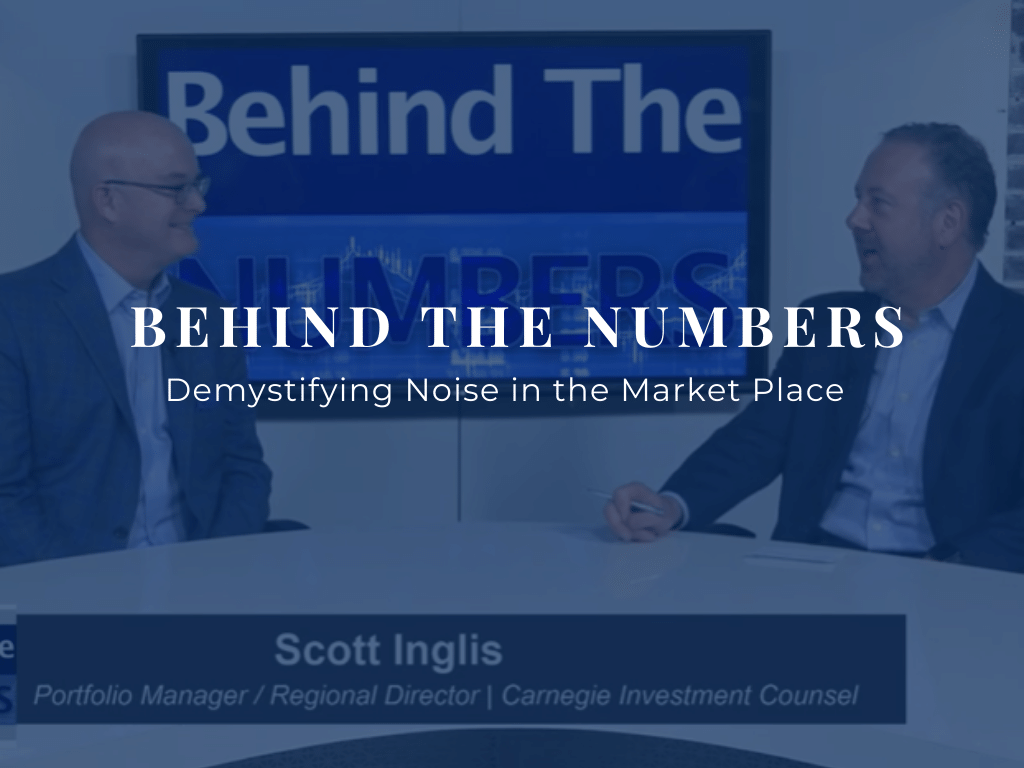
Recently, Carnegie Investment Counsel Portfolio Manager/Regional Director Scott Inglis was a guest of Behind the Numbers, which is a podcast about the “real stories” behind business performance and valuation. Inglis talked with the host, valuation expert and bestselling author Dave Bookbinder. Scott provided detailed insights around demystifying noise in the market place”. Here’s an overview of the conversation.
The Importance of a Fiduciary Adviser
There are a lot of different titles in the financial world, enough that Dave Bookbinder calls it “alphabet soup.” Scott agrees, pointing out the need for better guidance for the investing public. One of the most important details people need to understand is what the fiduciary standard really means. Carnegie provides a guide to choosing an adviser, and the fiduciary standard is a differentiator that is important.
A Registered Investment Adviser (“RIA”) is a firm, like Carnegie, that is regulated by the SEC (if over a certain size, or otherwise at the state level). Also, an RIA firm is held to a fiduciary standard where it is required to put the interest of the client ahead of its own interest. “I think it’s very important for people to know, if they’re working with an adviser, how they’re compensated,” Scott explains.
Diversifying Your Portfolio
Another topic the pair discussed was how people should think about diversification. It’s a common topic, especially for people who are just beginning their careers.
On the podcast, Scott notes that he’s seen a lot of situations where portfolios become overly diversified. “I’ve looked at portfolios that have had 30, 40 different mutual funds in them, and those funds all have fees. And on top of that, they’re paying an advisory fee, so that type of diversification I call di-worse-ification.” Aside from the multiple layers of fees, if one portfolio has this many mutual funds, there is a high probability of owning the same security multiple times in the different mutual funds. Per Scott, in this scenario, over-diversification is no free lunch.
You can still achieve appropriate diversification, but you want to build a portfolio that is transparent and takes out all those layers of costs. Carnegie focuses on building a portfolio with individual securities to achieve that.
The Value of an Adviser
Working with a financial adviser, rather than managing finances entirely on your own, can increase the value of your portfolio. Vanguard suggests that working with one can add up to 3 percent per annum in value, while Morningstar suggests it can add up to 1.6 percent. But in both cases, the companies agree that the single biggest driver of added value is the objective advice and behavioral coaching that comes from working with an independent party (a financial adviser).
“With our own money, we tend to be emotional: Emotions and financial decisions inherently become intertwined,” Scott explains. “The biggest value-add, according to those studies and according to my experience, is the emotional objectivity that an adviser brings to the relationship.” An adviser’s role is to present facts and ethically backed guidance, which in turn, should help people make unemotional, objective decisions about money.
Moreover, the value of a financial adviser really comes into play during retirement planning. The additional element of behavioral coaching helps clients navigate those decisions; Scott explains during the podcast. “We find that the confidence that comes with partnering with somebody is a huge weight lifted off clients’ shoulders; knowing that they’re not in this by themselves.”
Looking for Top Investment Advice?
Find out more by tuning in to the Behind the Numbers podcast or by discussing your investment questions with a financial adviser at Carnegie Investment Counsel.


